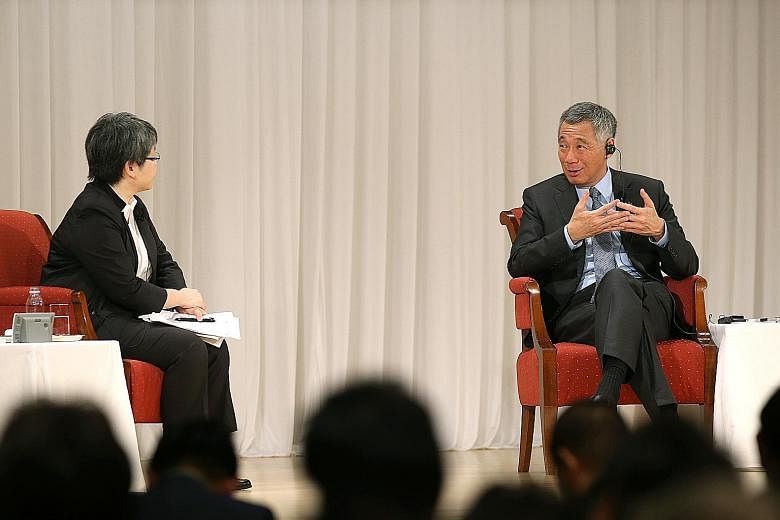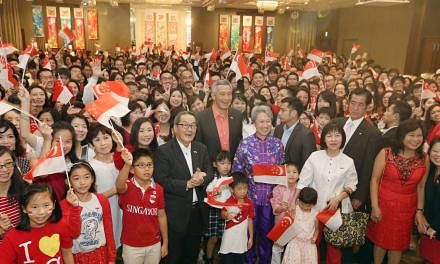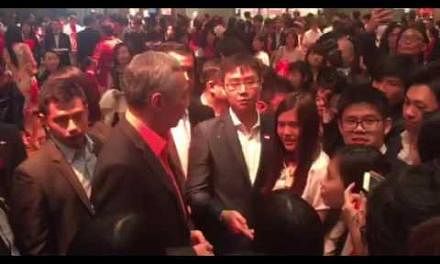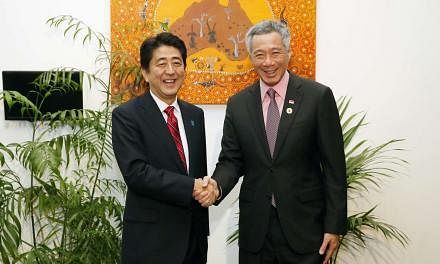The Asia-Pacific region is entering a period of major geopolitical shifts and difficult internal conditions, Prime Minister Lee Hsien Loong said yesterday.
"Countries can only succeed in this challenging environment by strengthening our cooperation, and not by turning inwards," he told more than 500 readers of the Nikkei newspaper at a special session of the publication's annual conference in Tokyo.
It was the last key event on his four-day visit to mark 50 years of diplomatic ties between Singapore and Japan. More than 2,000 people had applied to attend the one-hour session at the Imperial Hotel.
Mr Lee noted that in many places, "protectionist, anti-immigrant, anti- globalisation sentiments are prevalent". Asia is "not doing badly", but also has its own issues, he added at the start of a speech focused on shifting regional dynamics.
China's rise is a huge plus for the world, he stressed, given its interdependence with other countries. But its increasing influence means countries need to "make major adjustments", and that requires "restraint and wisdom from all sides".
As China takes on new responsibilities, it should also "be mindful of the natural unease and apprehension that its rapid rise elicits in its neighbours and other powers".
Mr Lee said: "It should act in such a way as to demonstrate that it is committed to building win-win relationships with other countries, and that while it seeks to revise existing frameworks and rules, it is not about to overturn the established international order which it has itself benefited from."
And smaller countries like Singapore will have to "take the policies and interests of an emerging major player more into our calculations", though there are also benefits in the new opportunities for trade and economic cooperation with China.
Meanwhile, major powers should "accommodate the legitimate interests of a growing China" as it strives for even more influence at institutions such as the United Nations and World Bank.
"We have to expect frictions and disputes from time to time, especially between neighbours, because each country has its own national interests," Mr Lee said.
"It is thus not surprising that China is involved in territorial and maritime disputes in the South China Sea and the East China Sea.
"But all sides have a vested interest in reaching a new and workable balance, and in minimising conflict. For if countries fail to work together, we are not just losing opportunities to prosper together, but are also putting at serious risk all that we have achieved so far."
In this context, Japan, which for decades has been promoting peace, stability and development in the region, has an important role to play, Mr Lee said.
But it needs to "evolve" by taking "bolder moves" to reinvigorate its economy, he said, noting the structural reforms under way to bring in more overseas workers and to urge more women to enter the workforce. It also needs to continue looking outwards by making "a greater effort to expose its people to the world, especially the young".
He noted that Ivy League schools in the United States used to take in more Japanese students, but their numbers have since been surpassed by the South Koreans and Chinese.
Japan also needs to ensure stable and peaceful relations with its neighbours and big powers China and the US, Mr Lee said.
China and Japan should work together to manage disputes and pursue opportunities, and the US-Japan Security Alliance "anchors the US in the region, and restrains countries in North-east Asia from escalating their disputes", he added.
Mr Lee also said he hopes Japan will continue to play an "active and constructive role" in Asia, especially South-east Asia, through economic agreements like the Trans-Pacific Partnership and forums like the East Asia Summit.
Referring to Japan as a "key player" that influences the tone for the region, Mr Lee said: "I hope you will continue to play this constructive role and keep on promoting regional peace, stability and development for many years to come."











